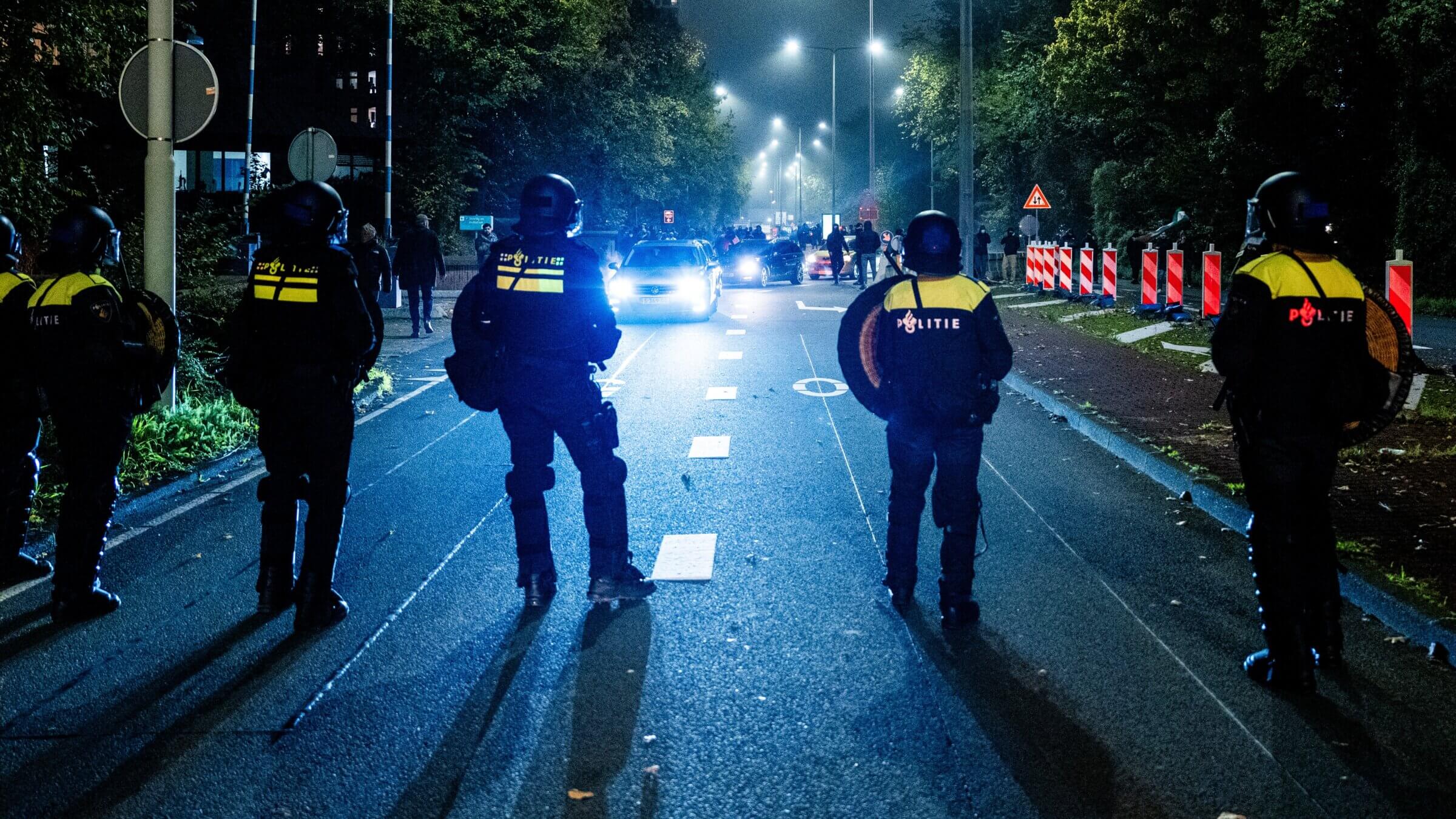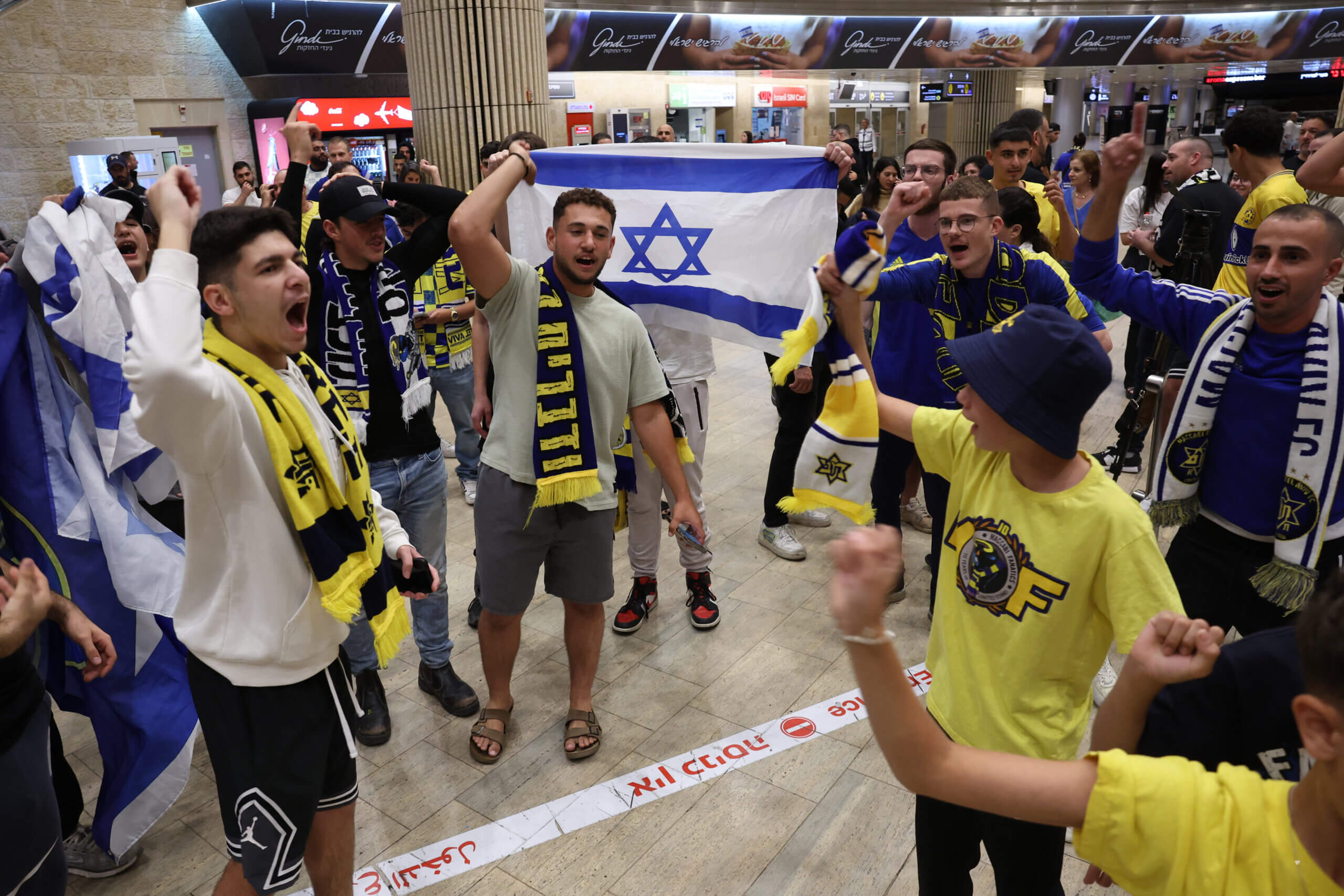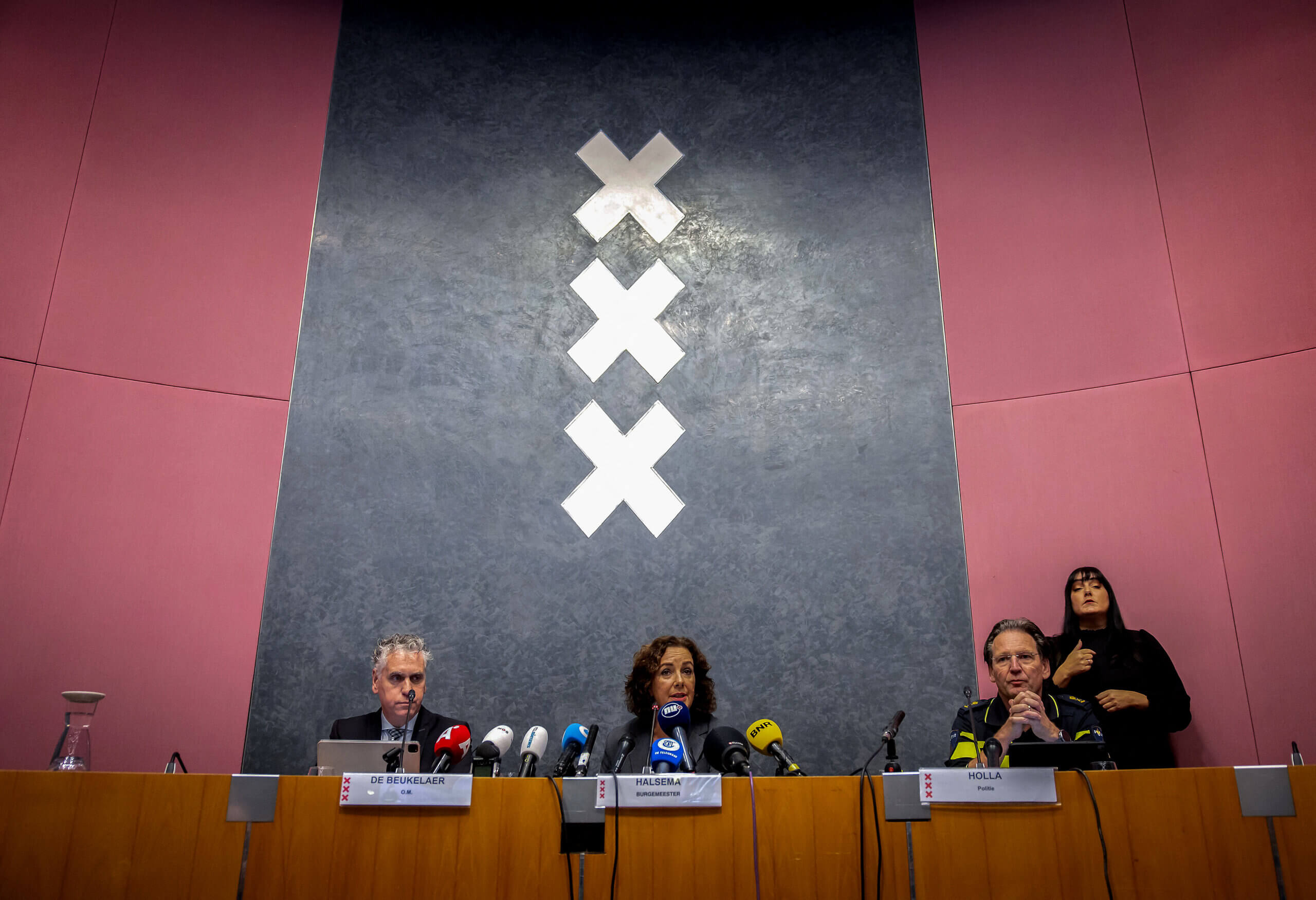Dutch Jews grapple with ‘weaponization’ of their fear following attack on Israelis
Many in the country’s small Jewish community say the incident was stripped of context, even as they worry about their own safety

Police officers secure a road during a pro-Palestinian demonstration on the sidelines of the soccer game between Ajax Amsterdam and Maccabi Tel Aviv in Amsterdam on Thursday. Photo by Getty Images
Members of the small Jewish community in Amsterdam confronted the city’s deputy mayor Friday morning, demanding answers for its failure to prevent violent attacks on Israeli soccer fans the night before that international Jewish organizations and leaders condemned as a pogrom.
“My parents are terrified, I am terrified,” one man shouted in Dutch during the gathering. “I have a little daughter — what will be done, goddamnit?”
An older Jewish man bundled in a winter coat replied: “Nothing, absolutely nothing. Since Oct. 7, nothing.”
It was an expression of the anguish that many of Amsterdam’s estimated 15,000 Jewish residents were feeling the day after five Israeli supporters of Maccabi Tel Aviv in town for a game against Ajax were hospitalized after attacks by Arab and Muslim assailants that the mayor called “antisemitic hit-and-run squads.” The police originally detained 62 people in connection with the attacks, and by Saturday had four still in custody facing possible charges of public violence. The authorities banned demonstrations and full face coverings in the city for three days.
Videos on social media showed men running through the streets Thursday night beating Israelis and shooting fireworks at them. “Gaza!” a man lighting firecrackers yells in one clip. “Now you know how it feels.” A Dutch blog posted screenshots from a WhatsApp group showing people discussing a “Jew hunt” before the assaults.
But some Dutch Jews noted that roving bands of Maccabi Tel Aviv fans had spent Tuesday and Wednesday nights marauding through the city center chanting racist anti-Arab slogans, climbing a facade to rip a Palestinian flag off the second story of an apartment building and assaulting a Moroccan taxi driver.
Jelle Zijlstra, who is Jewish and works as a community organizer in Amsterdam, made a post that went viral on Instagram stating that “multiple truths can exist at the same time.” It highlighted both the assaults on Israelis and footage of the fans shouting “F— Palestine” the night before.
“There was definitely antisemitism involved in some of the events that took place,” Zijlstra said in an interview. “Were Jews attacked in the streets? Yes, but those Jews were also violent hooligans.”
Hooliganism and street assaults
Hundreds of Maccabi Tel Aviv fans traveled to Amsterdam this week for a Thursday night game against Ajax, a top soccer team in the Netherlands that has long had warm ties with Israel and whose fans refer to themselves as “Jews.”
Tori Eghermann, an American Jew who moved to Amsterdam 20 years ago, said she passed by Dam Square, in the city center, on Thursday night and saw the Maccabi fans there singing and lighting smoke bombs. “They were really incredibly well organized and hyped up,” she said.
Eghermann noted that violent clashes between local residents and racist soccer hooligans are not uncommon in Amsterdam. “It’s not as though football fan clubs are known for their peaceful presence in the community.”
The Israeli fans later clashed with pro-Palestinian demonstrators, singing “F— you Palestine” and shouting “Let the IDF f— the Arabs.”

Ori Goldberg, a leftist Israeli academic who follows sports culture, said that Maccabi Tel Aviv does not have a reputation for right-wing politics, like the infamous Beitar Jerusalem, whose fans long prevented the team’s owners from signing Arab players.
“Maccabi Tel Aviv is the mainstream’s mainstream,” Goldberg said. “But the behavior of the fans is very Israeli at the moment: The world hates us anyway because the world hates Jews, so we’ll take our fight and our cause with us everywhere we go.”
It was unclear how much the assaults that took place on Thursday night — including throwing an Israeli fan into a canal and forcing him to shout “Free Palestine” — were planned in advance, versus a spontaneous response to offensive behavior by Israeli fans. Israeli news outlets reported that hundreds of men had gathered outside of their hotel after the game and set up checkpoints demanding to see tourists’ passports.
“We don’t know that the people who got attacked last night were those same people who chanted racist chants,” said Asjer Waterman, a rabbinical student in Amsterdam. “There is real evidence that people went ‘Jew hunting.’”
Ami Shuman, a photographer for the right-wing Israeli newspaper Israel Hayom, said he was trapped with his son while trying to escape the violence Thursday night, and that they eventually had to be escorted back to their hotel by the police.
“We saw violence, we saw people with black eyes, deep cuts under their eyes, we saw someone accidentally hit by a police officer, and a woman crying,” Shuman told The Times of Israel. “They came in masses, running through the alleys.”
Forced to answer for Israel
Waterman, who also works as a strategic adviser to a local nonprofit called Jewish Social Work, spent Friday helping Israeli fans who volunteers had ferried to a safe location provided by a Jewish sports club in Amsterdam.
He noted that the violence appeared to have been targeted only at the Israeli visitors, and not Dutch Jews or Jewish institutions. But Waterman said many in the community were nonetheless shaken, especially after a year in which they have faced a spike in antisemitic and anti-Israel activity in the aftermath of the Oct. 7 terrorist attack in Israel and the start of the war in Gaza.
Hundreds of demonstrators protested outside the opening of the city’s first Holocaust museum in March, objecting to the presence of Israeli President Isaac Herzog but also accusing Dutch Holocaust survivors who attended of being “Zionist scum” and “baby killers.”

Waterman said many Dutch Jews are treated like representatives of Israel, a special burden in a country of only 30,000 Jews. “You might be the only Jewish kid in your school and kids say, ‘Hey, what are you people doing in Israel? Why are you killing kids?’” he explained. “It can force you to defend things you don’t necessarily agree with.”
Antisemitic chants are also common at Dutch soccer stadiums. “Hamas, Hamas, Jews to the gas,” used to be a popular cheer for fans of teams playing Ajax, because of its association with Jews. It has fallen out of favor in recent years, but other derogatory songs have taken its place.
“I’ll speak to fans who assure me that they are not antisemitic, they’re just doing it because of Ajax, but there’s definitely some other factors,” said Boaz Krone, a social worker in Amsterdam.
Meanwhile, far-right Dutch politicians, who took control of the government in July, have positioned themselves as protectors of Holland’s Jews by seizing on antisemitism from Arab and Muslim residents of the country.
“A pogrom in the streets of Amsterdam,” Geert Wilders, who leads one of the party’s in the government coalition, said on the social platform X (formerly Twitter) Friday. “We have become the Gaza of Europe.”
This kind of rhetoric grates on Zijlstra, the community organizer whose Instagram post went viral. He has been frustrated by an insistence on the left that violence against the Israelis was justified — and by politicians like Wilders who are stripping the attacks of context to push an agenda that most of the country’s Jews don’t support.
“I really think that we should try to stay sane and not allow our pain and trauma to be weaponized like this,” he said.
















